北师大版(2019)必修 第一册Unit1 Life Choices Lesson 1 Lifestyles Grammar 动词不定式 课件 (共40张PPT)
文档属性
| 名称 | 北师大版(2019)必修 第一册Unit1 Life Choices Lesson 1 Lifestyles Grammar 动词不定式 课件 (共40张PPT) | 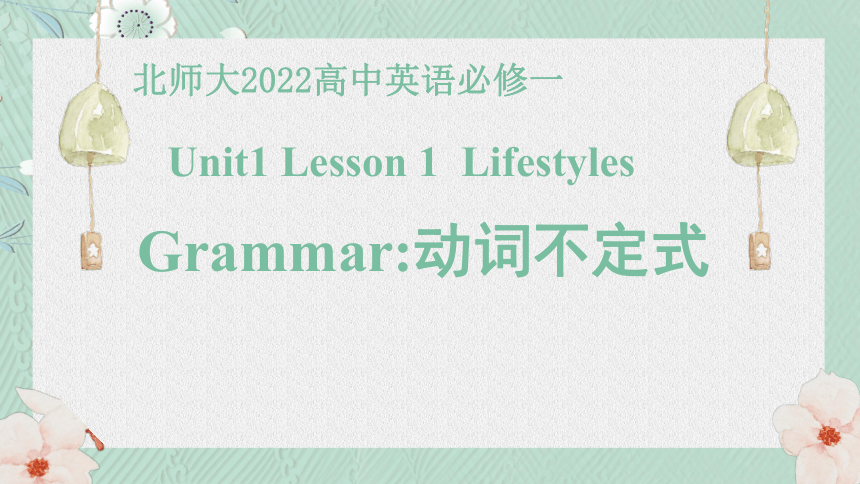 | |
| 格式 | pptx | ||
| 文件大小 | 4.1MB | ||
| 资源类型 | 教案 | ||
| 版本资源 | 北师大版(2019) | ||
| 科目 | 英语 | ||
| 更新时间 | 2023-06-02 20:44:29 | ||
图片预览

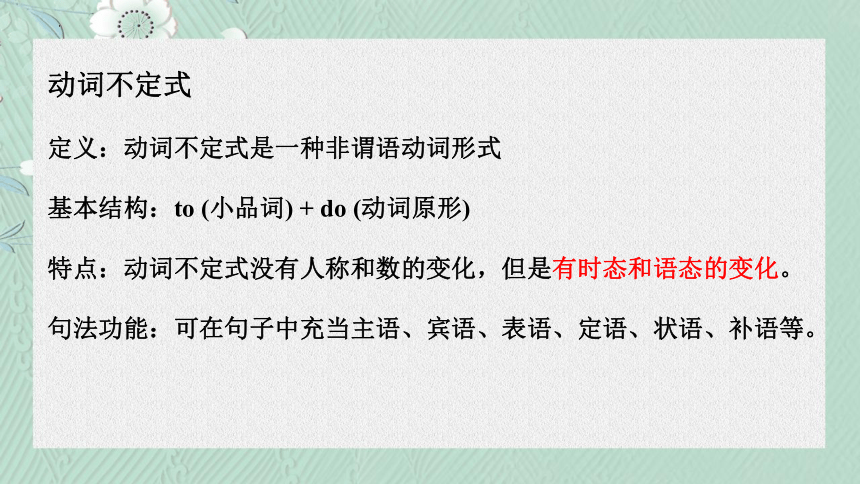

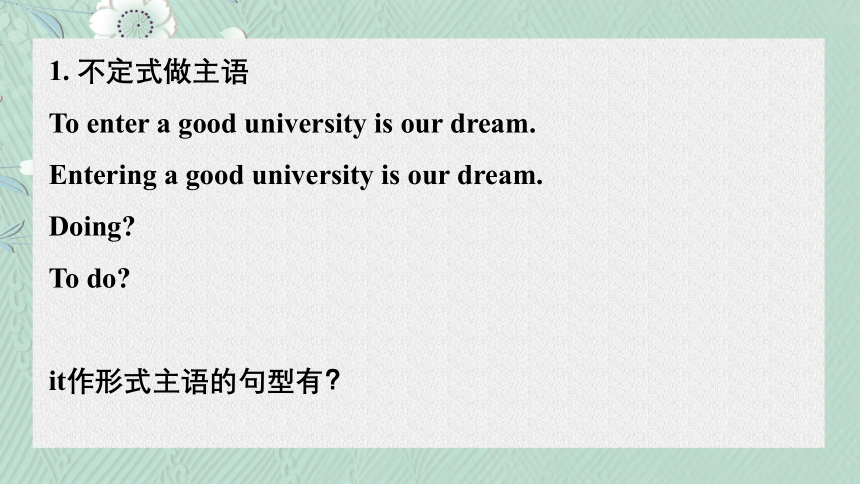
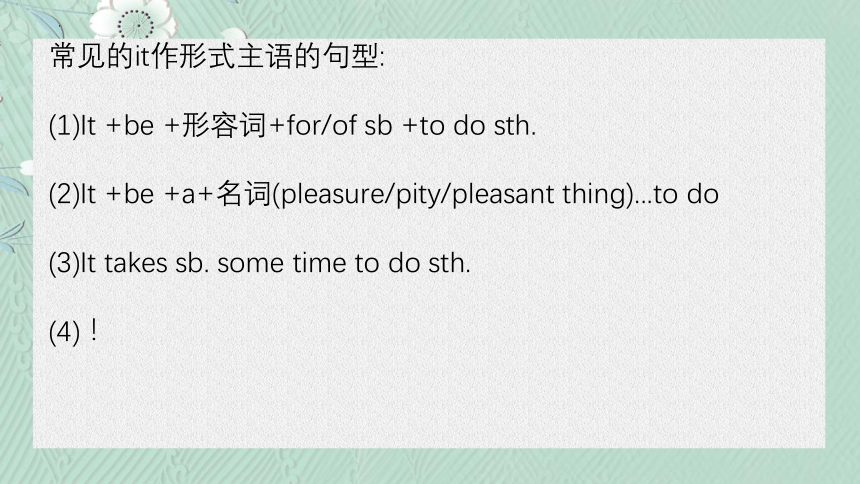
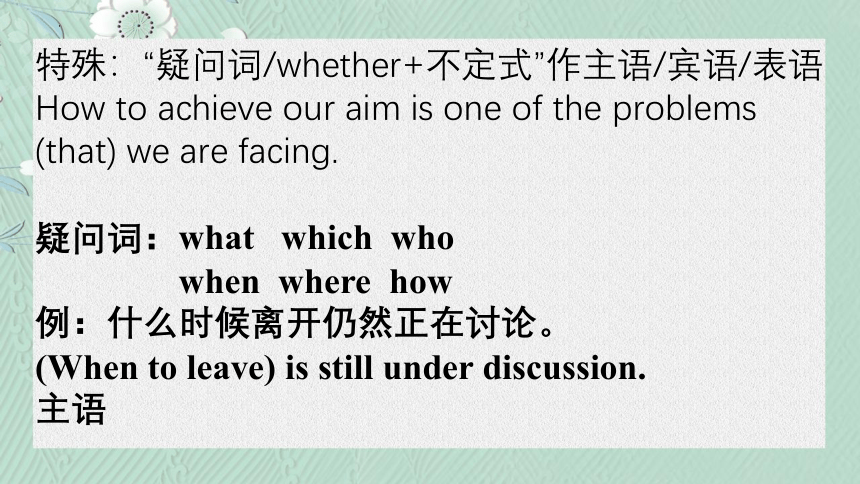
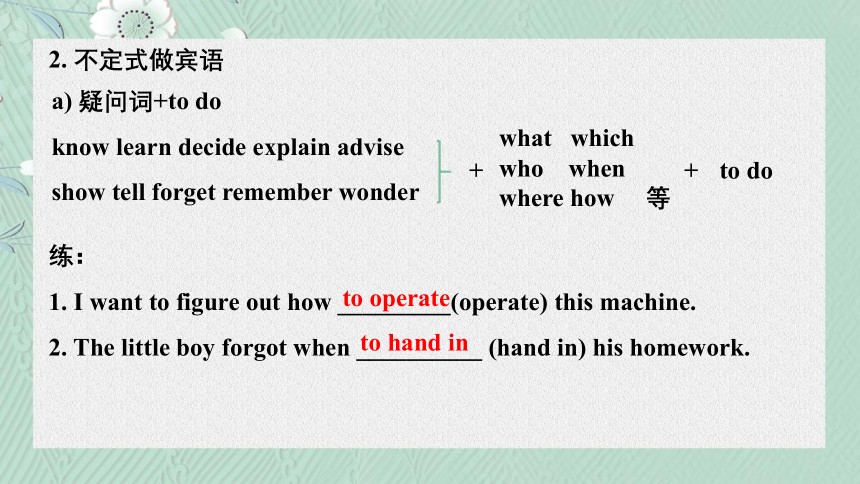
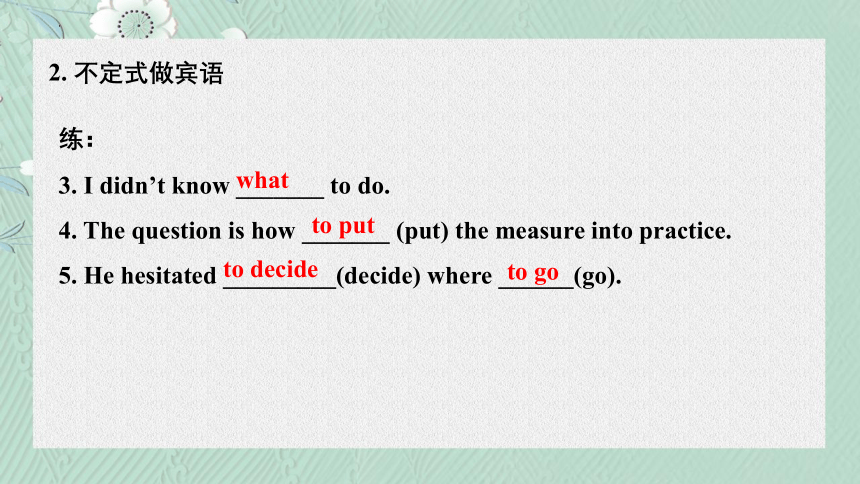
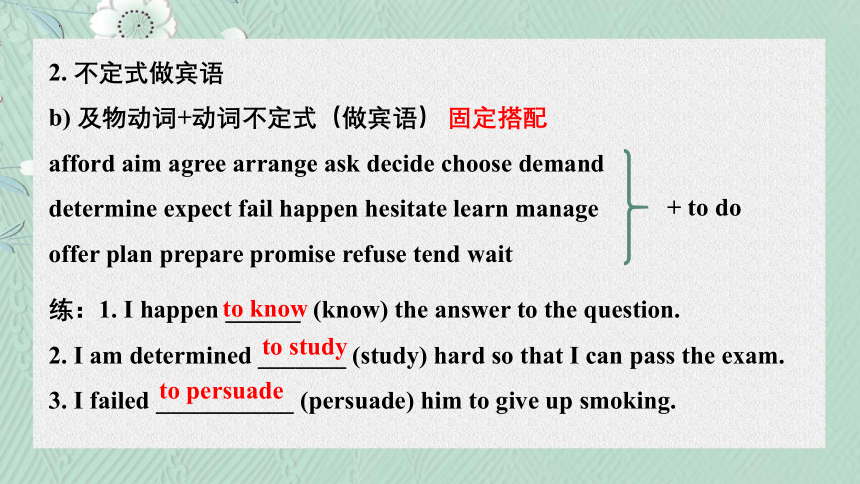
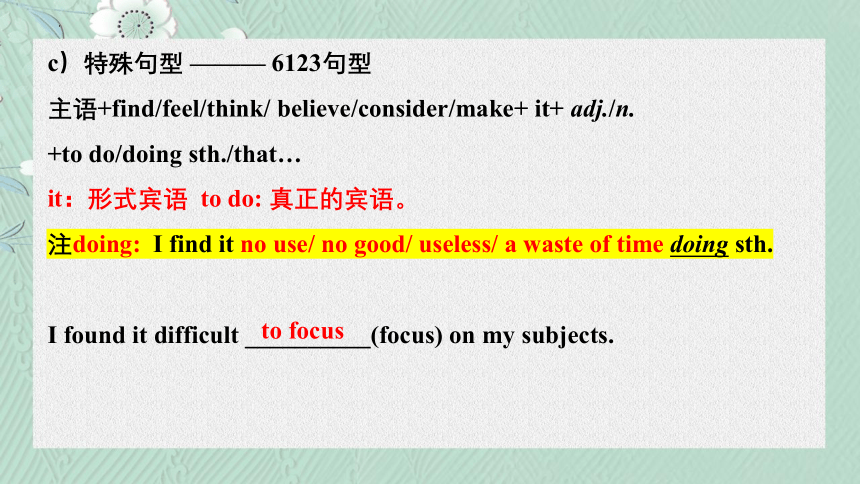
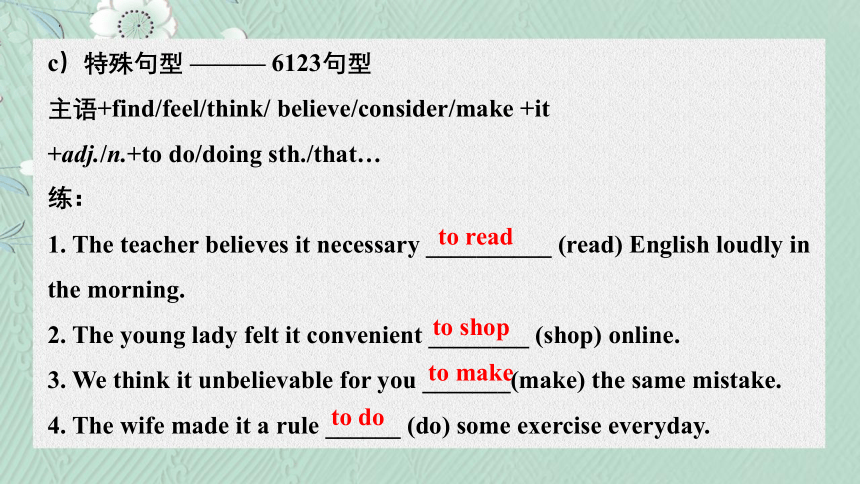
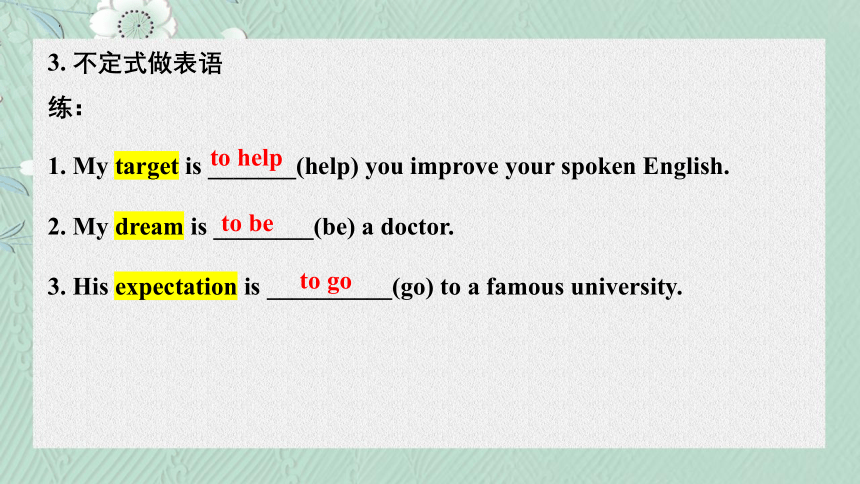
文档简介
(共40张PPT)
北师大2022高中英语必修一
Unit1 Lesson 1 Lifestyles
Grammar:动词不定式
动词不定式
定义:动词不定式是一种非谓语动词形式
基本结构:to (小品词) + do (动词原形)
特点:动词不定式没有人称和数的变化,但是有时态和语态的变化。
句法功能:可在句子中充当主语、宾语、表语、定语、状语、补语等。
动词不定式
做什么成分?
1. 不定式做主语
To enter a good university is our dream.
Entering a good university is our dream.
Doing
To do
it作形式主语的句型有?
常见的it作形式主语的句型:
(1)It +be +形容词+for/of sb +to do sth.
(2)It +be +a+名词(pleasure/pity/pleasant thing)...to do
(3)It takes sb. some time to do sth.
(4) !
特殊:“疑问词/whether+不定式”作主语/宾语/表语
How to achieve our aim is one of the problems
(that) we are facing.
疑问词:what which who
when where how
例:什么时候离开仍然正在讨论。
(When to leave) is still under discussion.
主语
a) 疑问词+to do
know learn decide explain advise show tell forget remember wonder
+
what which
who when
where how 等
+
to do
练:
1. I want to figure out how _________(operate) this machine.
2. The little boy forgot when __________ (hand in) his homework.
to operate
to hand in
2. 不定式做宾语
2. 不定式做宾语
练:
3. I didn’t know _______ to do.
4. The question is how _______ (put) the measure into practice.
5. He hesitated _________(decide) where ______(go).
what
to put
to decide
to go
2. 不定式做宾语
b) 及物动词+动词不定式(做宾语)
afford aim agree arrange ask decide choose demand determine expect fail happen hesitate learn manage offer plan prepare promise refuse tend wait
+ to do
固定搭配
练:1. I happen ______ (know) the answer to the question.
2. I am determined _______ (study) hard so that I can pass the exam.
3. I failed ___________ (persuade) him to give up smoking.
to know
to study
to persuade
c)特殊句型 ——— 6123句型
主语+find/feel/think/ believe/consider/make+ it+ adj./n.
+to do/doing sth./that…
it:形式宾语 to do: 真正的宾语。
注doing: I find it no use/ no good/ useless/ a waste of time doing sth.
I found it difficult __________(focus) on my subjects.
to focus
c)特殊句型 ——— 6123句型
主语+find/feel/think/ believe/consider/make +it
+adj./n.+to do/doing sth./that…
练:
1. The teacher believes it necessary __________ (read) English loudly in the morning.
2. The young lady felt it convenient ________ (shop) online.
3. We think it unbelievable for you _______(make) the same mistake.
4. The wife made it a rule ______ (do) some exercise everyday.
to read
to shop
to make
to do
3. 不定式做表语
练:
1. My target is _______(help) you improve your spoken English.
2. My dream is ________(be) a doctor.
3. His expectation is __________(go) to a famous university.
to help
to be
to go
4. 不定式做状语
a) 表目的:to do/ in order to do/ so as to do
练:1. _____________(recover) from the bad cold, he followed the doctor’s advice strictly.
2. He worked hard _____________(live up to) his parents’ expectation.
3. Students should read various books _______(broaden) their horizon.
4. I am on a diet __________(lose) weight.
5. ________(change) the living conditions, he rebuilt his house.
To recover
to live up to
to broaden
to lose
To change
b) 表出乎意料的结果
only to do:
1. He rushed to the train station, only ______ (find) the train had left.
2. He studied hard, only _________(find) he had failed to pass the exam.
3. I went to the bakery shop, only ____(tell) that the bread were sold out.
to find
to find
to be told
too…to: She is too young to carry the box.
enough to: She is not old enough to carry the box.
so…that : She is so young that she can’t carry the box.
c) 表原因 be + adj. + to do
练:
1. They are surprised _______(hear) that they won the game.
2. He was happy ______ (meet) his old friend.
3. I am glad _______ (make) preparations for the party.
to hear
to meet
to make
5. 不定式做补语 1-4
allow challenge consider drive tell encourage find force invite order permit persuade send suppose think
+ 宾语 + to do (宾语补足语)
练:1. The teacher allow students ________ (have) a discussion during the class.
2. I persuaded my father not ________ (swim) alone in the river.
3. I invite Tom _________ (attend) the meeting.
to have
to swim
to attend
5. 不定式做补语 2-4
I make my daughter play the piano.
My daughter is made to play the piano (by me).
在一感feel,二听listen to; hear,三让let; make; have,
五看see; watch; look at; notice; observe; 等词后,不定式不加to
但是变被动,必须带to
不定式的特殊含义/用法 3-4
forget, remember, regret等
to do
doing
+
动作未做
动作已做
练:1. Please remember __________ (lock) the door when you leave.
2. I remembered ________ (do) my homework, so that I went out to play.
3. I regretted ______(do) it, but I had no choice at that time.
4. I will not regret _______(tell) her the truth.
to lock
doing
doing
to tell
不定式的特殊含义/用法 3-4
stop/continue
to do
doing
+
另一件事
同一件事
练:
1. The dog stopped ________(bark), because the baby fell into sleep.
2. When I heard mom back home, I stopped ______(read) books.
3. After a rest, he continues ________(read).
4. After he finished reading a novel, he continued ________(play) games with his friends.
barking
to read
reading
to play
不定式用于with复合结构中作宾补 4-4
with复合结构:with+宾语+宾补
e.g. Maia came the classroom, with a book in her hand.
He likes sleeping with the window open/closed.
With the boy leading the way, I found my house.
With the hair cut, he looks more handsome.
不定式用于with复合结构中作宾补 4-4
with复合结构:with+宾语+宾补
宾补(介短/adj./ doing/ done/to do)
e.g. Maia came the classroom, with a book in her hand.
He likes sleeping with the window open/closed.
With the boy leading the way, I found my house.
With the hair cut, he looks more handsome.
不定式用于with复合结构中作宾补 4-4
with复合结构:with+宾语+宾补
With much homework to do, I didn’t have lunch.
With much homework to be done, I didn’t have lunch. ×
在with复合结构中,只有with sth. to do,
没有with sth. to be done
主动表被动
主动表被动:
with sth. to do,
English is easy to learn. (to be learnt×)
n. + be +adj. +to do (do 与n. 是动宾关系)
3. There be/have +n. +to do (do 与n. 是动宾关系)
There is nothing to worry about.
6. 不定式做定语(后置)
The weather will keep warm in the days________(come).
2. You should take the chance ____________ (get ahead) in your career.
to come
to get ahead
不定式作定语要后置,往往表示未发生的动作。
抽象名词(time, way, courage, reason, chance, opportunity, ability等)与不定代词(something, nothing, little等)的后面常用不定式作定语。
6. 不定式做定语(后置)
3. He is always the last person ______ (leave) the classroom.
4. There is nothing _______ (worry) about.
to leave
“There be+主语+to do”和“have sth. to do”结构中,不定式作后置定语。
中心词是序数词/形容词最高级以及the last/the only/the next,或被这些词修饰时。
to worry
He hopes to be offered a job to drive for a boss. 这句话,不定式就按照定语来翻译:“他希望得到一份为老板开车的活儿。”
to drive for a boss 说明了job 的具体内容,之间存在“同位关系”。不定式作定语,可以表示多种修饰关系:以下三句,不定式都是作定语,但被修饰语和不定式之间的关系却不尽相同。
同位关系:
Reading, I think, is the best way to learn English. 我认为,阅读是学习英语的最好方法。
What impressed me was their ability to deal with any problem. 给我留下深刻印象的是他们处理任何问题的能力。
“同位关系”是指不定式说明被修饰词的内容,像way, ability,right(权力),ambition(雄心),chance(机会;可能性),determination(决心,决定),favour(善行,恩惠),honour (荣幸,荣誉),intention(打算),plan(计划)等,经常接不定式表示同位关系。
2. 主谓关系:
This is the key to open the front door. 这是打开前门的钥匙。
He is the first man to discover the secret. 他是第一个发现秘密的人。被修饰词和不定式存在“主谓关系”:the key是open the front door的逻辑主语。the first man是discover the secret的逻辑主语。
3. 动宾关系:
John said he had an important meeting to attend. 约翰有一个重要的会议要参加。
We only have a small room to live in. 我们只有一个小房间住。
不定式和被修饰语存在“动宾关系”:an important meeting是attend的逻辑宾语。a small room是live in的逻辑宾语。
含动词不定式固定句型:
1. 主语+be+adj.(表情感)+to do sth.
2. too... to do sth...
3. enough... to do sth...
4. It + be + adj. + for/of sb. + to do sth
5. It be time to do sth.
6. It be one’s turn to do sth.
补充:
to 的省略情况
一. 跟在表示“除…以外”的不定式中(do sth. but/except do sth.) 前有do的任何形式时(do/did/does), 必须省略不定式中的to
He did nothing but wait.
He had no choices but to wait.
一. 跟在表示“除…以外”的不定式中(do sth. but/except do sth.) 前有do的任何形式时(do/did/does), 必须省略不定式中的to
He did nothing but to wait.
He had no choices but to wait.
二. 不定式做表语,不定式中的to要保留。但当主语部分有do的任何形式时,to要省略。
My aim is to enter an ideal university.
The only thing that I can do now is wait.
All that I can do now is study hard.
What I can do now is study hard.
二. 不定式做表语,不定式中的to要保留。但当主语部分有do的任何形式时,to要省略。
My aim is to enter an ideal university.
The only thing that I can do now is to wait.
What I can do now is to study hard.
动词不定式
时态&语态
动词不定式的时态&语态
1. Li Ying’s aim is to do well in every subject.
2. When the teacher came in, he pretended to be reading.
3.When his mother came in, he pretended to have finished …
4. The car to be bought is for his sister.
动词不定式的时态&语态
1. Li Ying’s aim is to do well in every subject.
2. When the teacher came in, he pretended to be reading.
3.When his mother came in, he pretended to have finished …
4. The car to be bought is for his sister.
动词不定式的时态&语态
1. Li Ying’s aim is to do well in every subject.
2. When the teacher came in, he pretended to be reading.
3.When his mother came in, he pretended to have finished …
4. The car to be bought is for his sister.
一般时
进行时
完成时
to be done一般时的被动
动词不定式的时态与语态
主动语态 被动语态
一般时 to do to be done
完成时 to have done
进行时 to be doing
Thank you.
北师大2022高中英语必修一
Unit1 Lesson 1 Lifestyles
Grammar:动词不定式
动词不定式
定义:动词不定式是一种非谓语动词形式
基本结构:to (小品词) + do (动词原形)
特点:动词不定式没有人称和数的变化,但是有时态和语态的变化。
句法功能:可在句子中充当主语、宾语、表语、定语、状语、补语等。
动词不定式
做什么成分?
1. 不定式做主语
To enter a good university is our dream.
Entering a good university is our dream.
Doing
To do
it作形式主语的句型有?
常见的it作形式主语的句型:
(1)It +be +形容词+for/of sb +to do sth.
(2)It +be +a+名词(pleasure/pity/pleasant thing)...to do
(3)It takes sb. some time to do sth.
(4) !
特殊:“疑问词/whether+不定式”作主语/宾语/表语
How to achieve our aim is one of the problems
(that) we are facing.
疑问词:what which who
when where how
例:什么时候离开仍然正在讨论。
(When to leave) is still under discussion.
主语
a) 疑问词+to do
know learn decide explain advise show tell forget remember wonder
+
what which
who when
where how 等
+
to do
练:
1. I want to figure out how _________(operate) this machine.
2. The little boy forgot when __________ (hand in) his homework.
to operate
to hand in
2. 不定式做宾语
2. 不定式做宾语
练:
3. I didn’t know _______ to do.
4. The question is how _______ (put) the measure into practice.
5. He hesitated _________(decide) where ______(go).
what
to put
to decide
to go
2. 不定式做宾语
b) 及物动词+动词不定式(做宾语)
afford aim agree arrange ask decide choose demand determine expect fail happen hesitate learn manage offer plan prepare promise refuse tend wait
+ to do
固定搭配
练:1. I happen ______ (know) the answer to the question.
2. I am determined _______ (study) hard so that I can pass the exam.
3. I failed ___________ (persuade) him to give up smoking.
to know
to study
to persuade
c)特殊句型 ——— 6123句型
主语+find/feel/think/ believe/consider/make+ it+ adj./n.
+to do/doing sth./that…
it:形式宾语 to do: 真正的宾语。
注doing: I find it no use/ no good/ useless/ a waste of time doing sth.
I found it difficult __________(focus) on my subjects.
to focus
c)特殊句型 ——— 6123句型
主语+find/feel/think/ believe/consider/make +it
+adj./n.+to do/doing sth./that…
练:
1. The teacher believes it necessary __________ (read) English loudly in the morning.
2. The young lady felt it convenient ________ (shop) online.
3. We think it unbelievable for you _______(make) the same mistake.
4. The wife made it a rule ______ (do) some exercise everyday.
to read
to shop
to make
to do
3. 不定式做表语
练:
1. My target is _______(help) you improve your spoken English.
2. My dream is ________(be) a doctor.
3. His expectation is __________(go) to a famous university.
to help
to be
to go
4. 不定式做状语
a) 表目的:to do/ in order to do/ so as to do
练:1. _____________(recover) from the bad cold, he followed the doctor’s advice strictly.
2. He worked hard _____________(live up to) his parents’ expectation.
3. Students should read various books _______(broaden) their horizon.
4. I am on a diet __________(lose) weight.
5. ________(change) the living conditions, he rebuilt his house.
To recover
to live up to
to broaden
to lose
To change
b) 表出乎意料的结果
only to do:
1. He rushed to the train station, only ______ (find) the train had left.
2. He studied hard, only _________(find) he had failed to pass the exam.
3. I went to the bakery shop, only ____(tell) that the bread were sold out.
to find
to find
to be told
too…to: She is too young to carry the box.
enough to: She is not old enough to carry the box.
so…that : She is so young that she can’t carry the box.
c) 表原因 be + adj. + to do
练:
1. They are surprised _______(hear) that they won the game.
2. He was happy ______ (meet) his old friend.
3. I am glad _______ (make) preparations for the party.
to hear
to meet
to make
5. 不定式做补语 1-4
allow challenge consider drive tell encourage find force invite order permit persuade send suppose think
+ 宾语 + to do (宾语补足语)
练:1. The teacher allow students ________ (have) a discussion during the class.
2. I persuaded my father not ________ (swim) alone in the river.
3. I invite Tom _________ (attend) the meeting.
to have
to swim
to attend
5. 不定式做补语 2-4
I make my daughter play the piano.
My daughter is made to play the piano (by me).
在一感feel,二听listen to; hear,三让let; make; have,
五看see; watch; look at; notice; observe; 等词后,不定式不加to
但是变被动,必须带to
不定式的特殊含义/用法 3-4
forget, remember, regret等
to do
doing
+
动作未做
动作已做
练:1. Please remember __________ (lock) the door when you leave.
2. I remembered ________ (do) my homework, so that I went out to play.
3. I regretted ______(do) it, but I had no choice at that time.
4. I will not regret _______(tell) her the truth.
to lock
doing
doing
to tell
不定式的特殊含义/用法 3-4
stop/continue
to do
doing
+
另一件事
同一件事
练:
1. The dog stopped ________(bark), because the baby fell into sleep.
2. When I heard mom back home, I stopped ______(read) books.
3. After a rest, he continues ________(read).
4. After he finished reading a novel, he continued ________(play) games with his friends.
barking
to read
reading
to play
不定式用于with复合结构中作宾补 4-4
with复合结构:with+宾语+宾补
e.g. Maia came the classroom, with a book in her hand.
He likes sleeping with the window open/closed.
With the boy leading the way, I found my house.
With the hair cut, he looks more handsome.
不定式用于with复合结构中作宾补 4-4
with复合结构:with+宾语+宾补
宾补(介短/adj./ doing/ done/to do)
e.g. Maia came the classroom, with a book in her hand.
He likes sleeping with the window open/closed.
With the boy leading the way, I found my house.
With the hair cut, he looks more handsome.
不定式用于with复合结构中作宾补 4-4
with复合结构:with+宾语+宾补
With much homework to do, I didn’t have lunch.
With much homework to be done, I didn’t have lunch. ×
在with复合结构中,只有with sth. to do,
没有with sth. to be done
主动表被动
主动表被动:
with sth. to do,
English is easy to learn. (to be learnt×)
n. + be +adj. +to do (do 与n. 是动宾关系)
3. There be/have +n. +to do (do 与n. 是动宾关系)
There is nothing to worry about.
6. 不定式做定语(后置)
The weather will keep warm in the days________(come).
2. You should take the chance ____________ (get ahead) in your career.
to come
to get ahead
不定式作定语要后置,往往表示未发生的动作。
抽象名词(time, way, courage, reason, chance, opportunity, ability等)与不定代词(something, nothing, little等)的后面常用不定式作定语。
6. 不定式做定语(后置)
3. He is always the last person ______ (leave) the classroom.
4. There is nothing _______ (worry) about.
to leave
“There be+主语+to do”和“have sth. to do”结构中,不定式作后置定语。
中心词是序数词/形容词最高级以及the last/the only/the next,或被这些词修饰时。
to worry
He hopes to be offered a job to drive for a boss. 这句话,不定式就按照定语来翻译:“他希望得到一份为老板开车的活儿。”
to drive for a boss 说明了job 的具体内容,之间存在“同位关系”。不定式作定语,可以表示多种修饰关系:以下三句,不定式都是作定语,但被修饰语和不定式之间的关系却不尽相同。
同位关系:
Reading, I think, is the best way to learn English. 我认为,阅读是学习英语的最好方法。
What impressed me was their ability to deal with any problem. 给我留下深刻印象的是他们处理任何问题的能力。
“同位关系”是指不定式说明被修饰词的内容,像way, ability,right(权力),ambition(雄心),chance(机会;可能性),determination(决心,决定),favour(善行,恩惠),honour (荣幸,荣誉),intention(打算),plan(计划)等,经常接不定式表示同位关系。
2. 主谓关系:
This is the key to open the front door. 这是打开前门的钥匙。
He is the first man to discover the secret. 他是第一个发现秘密的人。被修饰词和不定式存在“主谓关系”:the key是open the front door的逻辑主语。the first man是discover the secret的逻辑主语。
3. 动宾关系:
John said he had an important meeting to attend. 约翰有一个重要的会议要参加。
We only have a small room to live in. 我们只有一个小房间住。
不定式和被修饰语存在“动宾关系”:an important meeting是attend的逻辑宾语。a small room是live in的逻辑宾语。
含动词不定式固定句型:
1. 主语+be+adj.(表情感)+to do sth.
2. too... to do sth...
3. enough... to do sth...
4. It + be + adj. + for/of sb. + to do sth
5. It be time to do sth.
6. It be one’s turn to do sth.
补充:
to 的省略情况
一. 跟在表示“除…以外”的不定式中(do sth. but/except do sth.) 前有do的任何形式时(do/did/does), 必须省略不定式中的to
He did nothing but wait.
He had no choices but to wait.
一. 跟在表示“除…以外”的不定式中(do sth. but/except do sth.) 前有do的任何形式时(do/did/does), 必须省略不定式中的to
He did nothing but to wait.
He had no choices but to wait.
二. 不定式做表语,不定式中的to要保留。但当主语部分有do的任何形式时,to要省略。
My aim is to enter an ideal university.
The only thing that I can do now is wait.
All that I can do now is study hard.
What I can do now is study hard.
二. 不定式做表语,不定式中的to要保留。但当主语部分有do的任何形式时,to要省略。
My aim is to enter an ideal university.
The only thing that I can do now is to wait.
What I can do now is to study hard.
动词不定式
时态&语态
动词不定式的时态&语态
1. Li Ying’s aim is to do well in every subject.
2. When the teacher came in, he pretended to be reading.
3.When his mother came in, he pretended to have finished …
4. The car to be bought is for his sister.
动词不定式的时态&语态
1. Li Ying’s aim is to do well in every subject.
2. When the teacher came in, he pretended to be reading.
3.When his mother came in, he pretended to have finished …
4. The car to be bought is for his sister.
动词不定式的时态&语态
1. Li Ying’s aim is to do well in every subject.
2. When the teacher came in, he pretended to be reading.
3.When his mother came in, he pretended to have finished …
4. The car to be bought is for his sister.
一般时
进行时
完成时
to be done一般时的被动
动词不定式的时态与语态
主动语态 被动语态
一般时 to do to be done
完成时 to have done
进行时 to be doing
Thank you.
同课章节目录
- Unit 1 Life Choices
- Lesson 1 Lifestyles
- Lesson 2 Understanding and Coping with Stress
- Lesson 3 Your Life Is What You Make It
- Unit 2 Sports and Fitness
- Lesson 1 The Underdog
- Lesson 2 Rules of the Game
- Lesson 3 Running and Fitness
- Unit 3 Celebrations
- Lesson 1 Spring Festival
- Lesson 2 Special Occasions
- Lesson 3 Memories of Christmas
